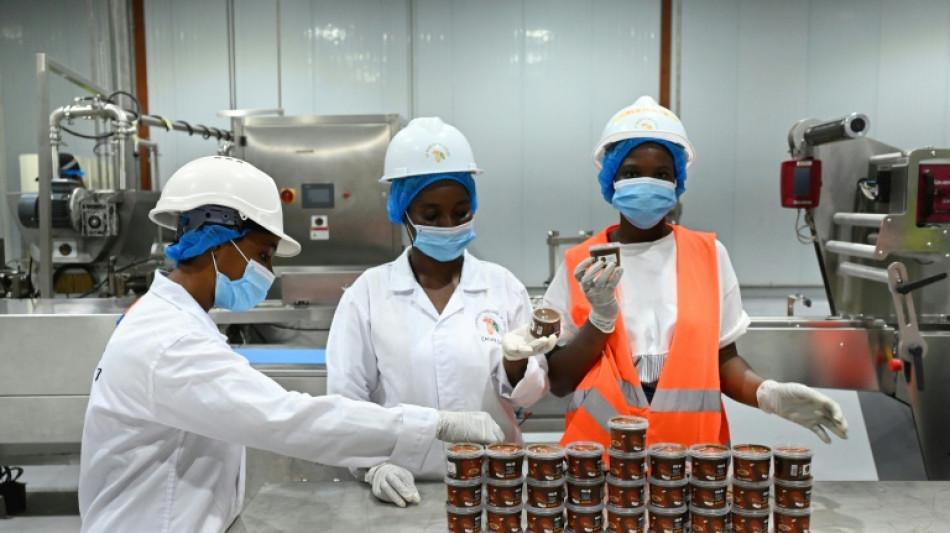
-
 Patrick Reed: Bad press stings, but leave my kids out of it
Patrick Reed: Bad press stings, but leave my kids out of it
-
George Clooney explores passage of time in Netflix film 'Jay Kelly'
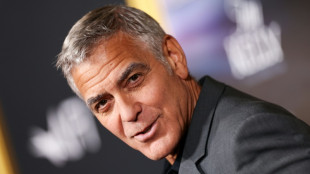
-
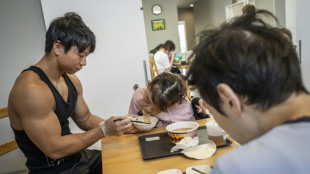 Young bodybuilders lift Japan's ailing care sector
Young bodybuilders lift Japan's ailing care sector
-
Stocks rally as traders cheer Trump-Xi meeting plan

-
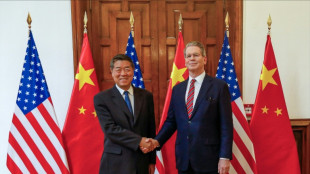 China, US 'can find ways to resolve concerns' as negotiators set to meet
China, US 'can find ways to resolve concerns' as negotiators set to meet
-
Trump says all Canada trade talks 'terminated'

-
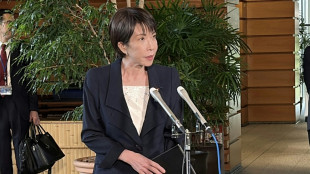 New Japan PM vows to take US ties to 'new heights' with Trump
New Japan PM vows to take US ties to 'new heights' with Trump
-
Women sue over sexual abuse in Australian military

-
 South Korea says 'considerable' chance Kim, Trump will meet next week
South Korea says 'considerable' chance Kim, Trump will meet next week
-
Brazil's Lula says would tell Trump tariffs were 'mistake'
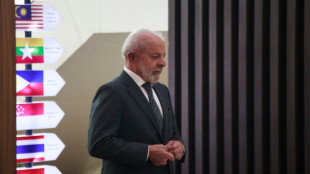
-
 Trump's Asia tour set to spotlight trade challenges
Trump's Asia tour set to spotlight trade challenges
-
Ivorian brothers dream of transforming cocoa industry
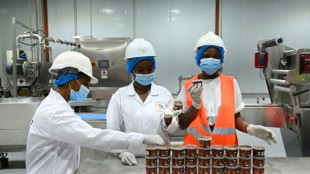
-
 Over 1,000 enter Thailand from Myanmar after scam hub raid
Over 1,000 enter Thailand from Myanmar after scam hub raid
-
Top Nigerian environmentalist sees little coming out of COP30
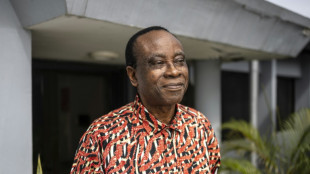
-
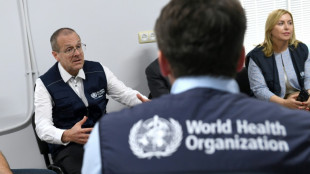 Europe must nurse itself after US aid cuts: WHO director
Europe must nurse itself after US aid cuts: WHO director
-
Venezuela's Maduro to US: 'No crazy war, please!'

-
 US, Japanese firms unwittingly hired North Korean animators: report
US, Japanese firms unwittingly hired North Korean animators: report
-
Precision timing for Britain's Big Ben as clocks go back

-
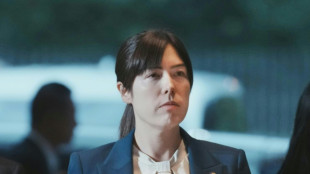 False claim spreads of Japan 'mass deportations' ministry
False claim spreads of Japan 'mass deportations' ministry
-
Alaska Airlines grounds entire fleet over IT outage

-
 Ecuador's president says he was target of attempted poisoning
Ecuador's president says he was target of attempted poisoning
-
Rybakina seals WTA Finals spot in reaching Tokyo semis

-
 Aldeguer fastest in rain-hit Malaysian MotoGP practice
Aldeguer fastest in rain-hit Malaysian MotoGP practice
-
Herbert's three TD passes lead Chargers NFL rout of Vikings

-
 Gilgeous-Alexander hits career-high 55 in Thunder double overtime win
Gilgeous-Alexander hits career-high 55 in Thunder double overtime win
-
Rebuilding wrecked Syria vital for regional stability: UN

-
 India trials Delhi cloud seeding to combat deadly smog
India trials Delhi cloud seeding to combat deadly smog
-
Top 14 offers France scrum-halves last audition as Dupont replacement

-
 Mbappe's Real Madrid aiming to end Barca Clasico dominance
Mbappe's Real Madrid aiming to end Barca Clasico dominance
-
Ashes in from the wilderness as England take on Australia

-
 High-flying Bayern pull away early in Bundesliga with Kane in complete control
High-flying Bayern pull away early in Bundesliga with Kane in complete control
-
Isak-less Liverpool look to hit stride, Man City 'back' to their best

-
 Asian stocks rally as traders cheer Trump-Xi meeting plan
Asian stocks rally as traders cheer Trump-Xi meeting plan
-
Japan inflation rises as new PM eyes economic package
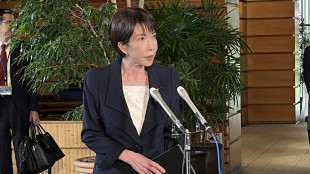
-
 UK to press 'coalition of willing' for more long-range missiles for Ukraine
UK to press 'coalition of willing' for more long-range missiles for Ukraine
-
Surgeons remove up to 100 magnets from N. Zealand teen's gut
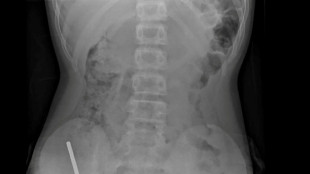
-
 Guayaquil mayor blames Ecuador's president as drug violence spirals
Guayaquil mayor blames Ecuador's president as drug violence spirals
-
Autistic adults push back on 'fear-based' Trump rhetoric

-
 New frontline in Canada-US tensions: the World Series
New frontline in Canada-US tensions: the World Series
-
Champion de Crespigny surprised to be named Wallabies skipper

-
 Trump completes demolition of White House East Wing: satellite images
Trump completes demolition of White House East Wing: satellite images
-
Vaultz Capital PLC - Trading Commences on the OTCQB Venture Market in the United States

-
 Ohtani ready for 'big series' as Dodgers face Blue Jays
Ohtani ready for 'big series' as Dodgers face Blue Jays
-
EU leaders lay out conditions for emissions target deal
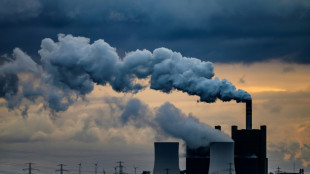
-
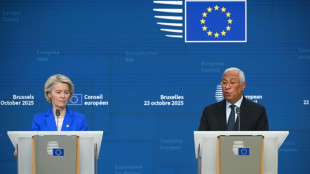 EU takes small step towards using Russian assets for Ukraine
EU takes small step towards using Russian assets for Ukraine
-
White House's East Wing demolished for Trump ballroom: satellite images

-
 Bajic stuns Palace in Conference League
Bajic stuns Palace in Conference League
-
Anthropic announces massive AI chip deal with Google

-
 Piastri confirms McLaren 'clean slate' after Texas tussle
Piastri confirms McLaren 'clean slate' after Texas tussle
-
Forest beat Porto on Dyche debut, Villa shocked by Go Ahead Eagles


Ivorian brothers dream of transforming cocoa industry
In a factory in southern Ivory Coast, where machines hum to produce chocolate bars and spreads, twin brothers dream of becoming "giants of cocoa processing".
Ivory Coast, which holds its presidential election this Saturday, is the world's leading cocoa producer but only processes about 40 percent locally while the rest is exported.
Fousseni and Alahassane Diakite, 33, opened a processing factory in August in their hometown of Divo, situated in a cocoa-dependent region some 200 kilometres (124 miles) from the economic capital Abidjan, with hopes of closing the gap.
Stored in jute sacks, the beans are roasted to unleash their aroma, shelled, and then ground.
The factory has a processing capacity of 36,000 tons annually, with a target of 80,000 tons.
Comparatively, US giant Cargill, Switzerland's Barry Callebaut, and Singapore's Olam each process between 100,000 and 200,000 tons of cocoa annually in the west African nation.
The twins' added value lies in "the quality of our products, our services," and their story, they told AFP.
Sons of a producer, "we are the pure products of Ivorian cocoa," said Fousseni, asserting that they are now realising their "dream".
"We were sure that what we were going to do was not just for us, but also to inspire other generations," he said.
A few years after earning their high school diplomas, they created a union of cooperatives bringing together over 4,000 producers.
They then founded their first company to create products for the pharmaceutical and cosmetic industries, such as cocoa butter, from the inedible parts of a cocoa pod.
Later, a second company was launched to process cocoa for food products.
Alahassane earned a business degree in Abidjan and has now pursued training at the HEC Paris business school.
Fousseni, meanwhile, has taken up practical training in agroforestry and agronomy.
"We complement each other," Alahassane said.
While their cosmetic materials are exported "where there is demand", he said, their chocolate for consumption is sold in Ivory Coast at competitive prices.
In stores, most chocolate bars, often European brands, cost between 2,500 and 4,000 CFA francs ($4 to $7), while the brothers' bar costs 1,200 francs ($2).
Their small jar of spread is sold at the unbeatable price of 100 francs.
At a time of growing demand for ethical products, "all our productions are traceable," assured Alahassane, while his brother specified that the factory's machines run on renewable energy.
- Creating jobs -
Cocoa accounts for five million jobs in Ivory Coast, or one-sixth of the population.
The government-set price of cocoa paid to growers is at a record level of 2,800 CFA francs per kilo.
A few kilometres from Divo, in a shaded plantation carpeted with cocoa tree leaves, Kanga Prudence N'Guessan was cutting yellow pods with a machete.
"Our wish... is not to send our cocoa outside our country... when processing is done there, it becomes two or three times more expensive," he said.
At another plantation, 49-year-old grower Harouna Ouattara agreed, saying, "local processing is insufficient."
"The first obstacle to cocoa processing is the issue of financing," explained Fousseni.
Their factory cost nearly 50 million euros ($58 million), the brothers noted, without specifying the source of the funds.
The second obstacle has been the lack of qualified labour.
Still, the brothers said their factory has created 1,000 direct and indirect jobs, primarily for locals.
Technical jobs are held by young people trained in major cities.
Salimata Ouattara, a 35-year-old chemist, studied in the southern port city of San Pedro.
In her white coat, between analyses, she said she wants to "help the youth here who don't have much knowledge about industrialisation."
L.Miller--AMWN